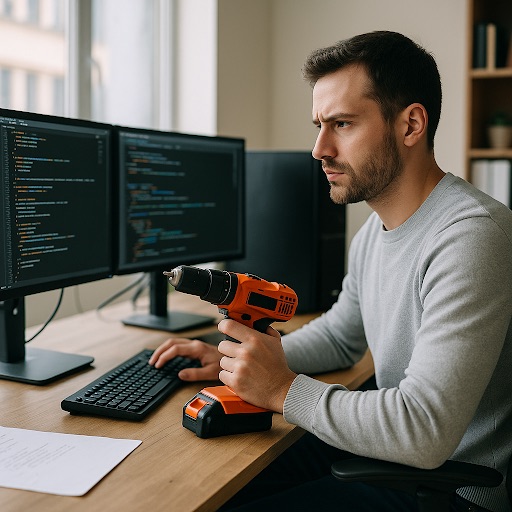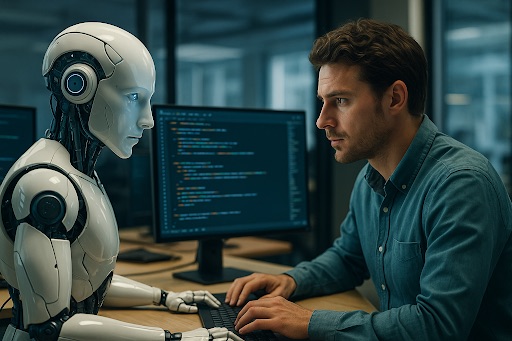Why AI Won’t Replace Programmers—But It Will Change Their Work Forever
The headlines make it sound simple: AI can code. It can spin up apps in minutes write functions, tests, and entire systems with a single prompt. So the question keeps coming up: if AI can do all that, do we still need programmers?
It’s a fair question. The truth is simple: AI will not replace programmers—but it will reshape what they do and that makes their role more valuable than ever.
AI Is a Power Tool, Not a Replacement
AI is like a power tool in the hands of a builder. A skilled carpenter can cut boards faster and cleaner with the right tool—but without the carpenter the house still collapses.
With AI, a developer might finish what used to take 30 hours in just 20. That speed is real, but speed alone does not equal safety, reliability, or business value. AI can generate code, but it does not understand the rules your business has to follow or the customers you serve.


The Assistant Who Still Needs Supervision
Programmers have always checked each other’s work because mistakes cost money and reputation. AI can now play that role too—but only as a junior assistant. It can spot patterns, flag errors, and make suggestions, but it won’t warn you when a line of code could expose customer data or crash your system during peak sales.
AI does not think in “consequences”. Without experienced oversight, that output can look polished but cause real damage once it is in production.
What You Are Really Paying For
There is a myth that faster code should mean cheaper code. But when you invest in development, you are not paying for raw lines of code—you are paying for judgment, foresight and the ability to design systems that scale and survive real-world use.
AI can write functions in seconds. It cannot replace the years of experience that allow a programmer to see the risks before they appear, to weigh tradeoffs, and to keep your business safe.
The Risks Are Already in the News
 This is not just theory. In 2015, TalkTalk’s systems were breached, exposing the personal data of 157,000 customers. In 2023, the MOVEit Transfer hack allowed attackers to steal data from hundreds of companies. Both disasters came from vulnerabilities in code that “worked” but was not secured.
This is not just theory. In 2015, TalkTalk’s systems were breached, exposing the personal data of 157,000 customers. In 2023, the MOVEit Transfer hack allowed attackers to steal data from hundreds of companies. Both disasters came from vulnerabilities in code that “worked” but was not secured.
Even smaller examples tell the same story. Tools like Lovable AI promise to build full apps in minutes. The demo looks amazing. But when you ask it to update or fix something, it often rewrites pieces you never wanted touched. The result is unpredictable code that looks fine until you actually rely on it. Without a programmer checking and refining that output, what you get is a house of cards — fast to build, but fragile where it counts.

Why Small Fixes Still Need Big Judgment
Even tiny changes ripple through entire systems. Adding one new field can disrupt reports, break permissions or change how data flows between teams. AI cannot see that ripple effect.
Programmers ask the hard questions, pause before hitting deploy and review the broader impact. They know correctness alone is never enough. What matters is safety, stability, and usability over time.

Code That Runs Is Just the Beginning
Getting code to execute is easy. Building software that scales, withstands stress and integrates smoothly with other systems is hard. AI can draft. It cannot maintain. It does not learn from past projects or answer support tickets when something breaks.
That accountability still belongs to humans who know the business context and who carry the responsibility when problems arise.
Faster and Stronger, Not Faster and Cheaper
AI has not erased the job of the programmer— it has reshaped it. By removing repetitive work, it allows developers to focus more on testing, review and strategy.
For business leaders, that does not mean cheaper software. It means stronger software. It means systems that last longer, stay secure, and actually solve the problems they were built to solve.


The Closing Answer
So will AI replace programmers? No, it won’t and it can’t. What it will do is make them faster and sharper while shifting their focus to the parts of the job that matter most.
The code may come from AI. But the protection, reliability and business value still come from people. That is the difference between code that simply runs today and systems that protect you tomorrow.

